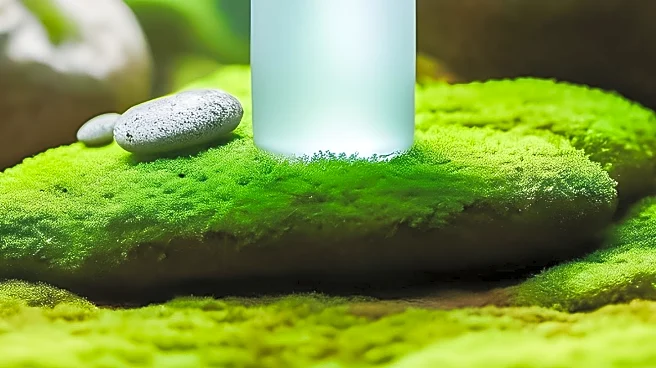What's Happening?
The global algae skincare market is projected to grow significantly, driven by consumer demand for natural ingredients that offer multifunctional benefits. Luxury beauty brands like 111Skin and Blue Lagoon are incorporating algae into their products,
highlighting its versatility in skincare. Algae, including macroalgae and microalgae, provides benefits such as antioxidant protection, collagen preservation, and barrier support. Brands are leveraging algae's ability to harmonize the skin's internal environment, enhancing the performance of other ingredients. Collaborations, such as 111Skin's partnership with Aman, showcase algae's potential in bespoke luxury beauty formulations.
Why It's Important?
The rise of algae as a key ingredient in luxury beauty products reflects a broader trend towards natural and sustainable skincare solutions. As consumers increasingly seek products that offer comprehensive benefits, algae's multifunctional properties position it as a valuable component in high-end formulations. This shift could influence the beauty industry's focus on sustainability and innovation, encouraging brands to explore new ingredients and methods. The growing market for algae-based skincare also presents economic opportunities for companies specializing in algae cultivation and extraction.
What's Next?
As the algae skincare market expands, brands may continue to innovate by developing new products that capitalize on algae's unique properties. Research and development efforts could focus on identifying additional species and extraction methods to enhance product efficacy. The collaboration between beauty brands and luxury hotels, like 111Skin and Aman, may inspire similar partnerships, further integrating algae into the luxury beauty sector. Additionally, consumer education on the benefits of algae could drive increased adoption and demand.
Beyond the Headlines
The use of algae in beauty products raises questions about sustainability and ethical sourcing. As brands incorporate algae into their formulations, they must consider the environmental impact of cultivation and extraction processes. The emphasis on renewable energy and carbon capture in algae production highlights a commitment to sustainable practices, which may influence consumer perceptions and brand reputation. Furthermore, the integration of algae into luxury beauty products reflects a cultural shift towards valuing natural and scientifically-backed ingredients.















